|
|
|
Sort Order |
|
|
|
Items / Page
|
|
|
|
|
|
|
| Srl | Item |
| 1 |
ID:
167213
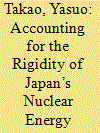

|
|
|
|
|
| Summary/Abstract |
This article examines the seven decades since the end of World War II and the evolution of Japan’s nuclear energy policy from the perspective of both domestic/international structures and coalition building processes. The objective is to identify the causal mechanism that has produced the rigidity of today’s Japanese nuclear energy policy. This study takes an analytically eclectic approach. Viewing the single puzzle of policy rigidity through two different lenses, political opportunity structures and advocacy coalition framework accounts for different facets of Japan’s nuclear energy policy. This approach can also connect otherwise contending frameworks together to reveal factors in the policy rigidity of nuclear energy.
|
|
|
|
|
|
|
|
|
|
|
|
|
|
|
|
| 2 |
ID:
092507
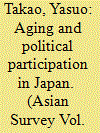

|
|
|
| 3 |
ID:
059921
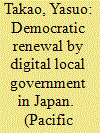

|
|
|
| 4 |
ID:
059513
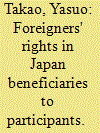

|
|
|
|
|
| Publication |
May-Jun 2003.
|
|
|
|
|
|
|
|
|
|
|
|
|
|
|
|
| 5 |
ID:
186408
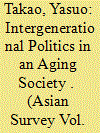

|
|
|
|
|
| Summary/Abstract |
Japan’s population is aging faster than any other nation’s, producing many more older voters, and raising an important question related to intergenerational equity. Do older voters prioritize their short-term self-interest at the expense of other generations? I find that the older voters in Japan are surprisingly less self-interested—even less than similarly aged voters in other advanced economies—in maximizing their benefits as service consumers to the detriment of younger voters. This behavior of older voters in Japan is an enigma. To stimulate dialogue about an equitable and sustainable welfare system, I consider a set of structural and institutional factors that may, individually or collectively, help explain the apparently less self-interested preferences of older voters in Japan.
|
|
|
|
|
|
|
|
|
|
|
|
|
|
|
|
| 6 |
ID:
167462
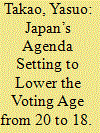

|
|
|
|
|
| Summary/Abstract |
What age a state designates as appropriate for voting rights raises a range of democratic and empirical issues. The lowering of the voting age in Japan in 2015 was the biggest expansion of the country’s democratic franchise since 1945, yet it happened in an abrupt manner. Lowering the voting age was not a significant issue among the Japanese public until the mid-2000s and the government began supporting the move officially only in 2014. Why then? What happened to precipitate this decision? This study argues that the circumstances governing the period before the policy decision was made are crucial to understanding what followed. In the prevailing theories of policy change, analysis has focused much more on the phase of decision making over policy; public opinion, policy beliefs, and policy transfer have been prominently cited as the major reasons for lowering the voting age in other countries. In contrast, this article claims that the policy opportunity spillover, from constitutional revision to voting age, was a necessary condition for lowering the age. The discussion of constitutional revision incidentally opened a policy window to another issue area, in this case voting age. The findings help us answer the question of what time period we need to examine in order to discern actual policy dynamics.
|
|
|
|
|
|
|
|
|
|
|
|
|
|
|
|
| 7 |
ID:
077756


|
|
|
|
|
| Publication |
2007.
|
| Summary/Abstract |
The 1979 UN Convention on the Elimination of all Forms of Discrimination against Women highlights the importance of equal participation of women in public life. Since the early 1960s, women in Japan have voted in elections at significantly higher rates than men. However, Japanese women's equal participation in policy formulation and decision making lags far behind major democracies. Gender equality is stated under the Japanese Constitution, but social practices are far from equal. There are no legal constraints on Japanese women's right to candidacy for public office, but they are far underrepresented in local and national elected assemblies. In 1999 an important landmark in the substantial progress towards gender equality took place when the Japanese government, for the first time, legally denounced the stereotyped division of roles on the basis of gender and described men and women as equal partners. An unprecedented amount of legislation, together with policy changes and organizational reform at the national level were introduced from this state-led initiation. In the same year, women's grassroots groups were rapidly moving beyond the reach of policy, organizational, and legal changes; they successfully conducted a major nationwide campaign for 'More Women to Assemblies¡' and increased the number of elected women representatives at the local level at an unprecedented rate. The purpose of this article is to assess the potential of increased women's political voices in Japan, which can be seen as an alternative way of solving the problems of political disengagement in the male-dominated representative democracy. To this end, the article examines the course of watershed events in 1999 towards a gender-equal society in Japan, with special emphasis on the importance of grassroots missions in eliminating barriers to Japanese women's political participation
|
|
|
|
|
|
|
|
|
|
|
|
|
|
|
|
| 8 |
ID:
131662
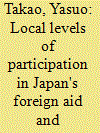

|
|
|
|
|
| Publication |
2014.
|
| Summary/Abstract |
This study will examine the determinants of local Japanese government involvement in decentralized international cooperation by taking an actor-specific approach to three outstanding cases: Shiga Prefecture, Kitakyushu City, and Yokohama City. It will look beneath the aggregate relationships to more qualitative evidence of localized motives for Japanese cooperation with developing countries.
|
|
|
|
|
|
|
|
|
|
|
|
|
|
|
|
| 9 |
ID:
118993
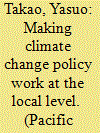

|
|
|
|
|
| Publication |
2012.
|
| Summary/Abstract |
This study will examine the state of local capacity building for local climate adaptation in Japan. Climate mitigation needs to be led by both global strategies and national mandates in an integrated way, but climate change impacts are manifested locally and adaptive capacity is determined by local conditions. The article first lays out the basic components of local capacity for decentralized policymaking and assesses the current local capacity in view of Japan's climate policy. The bulk of data employed in the study is derived from existing up-to-date government databases. It found that only the largest municipalities as well as prefectures have governing capacities to develop a comprehensive approach to climate adaptation while medium-sized municipalities have a potential to take a participatory approach to climate policy. It argues that some pioneering localities realize their potentials to take initiatives under political leadership but most localities act in a piecemeal fashion according to clear national-level guidance on climate change.
|
|
|
|
|
|
|
|
|
|
|
|
|
|
|
|
| 10 |
ID:
152072
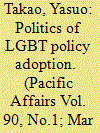

|
|
|
|
|
| Summary/Abstract |
This article will examine the determinants of LGBT (lesbian, gay, bisexual, and transgender) policy adoption in Shibuya, one of the twenty-three city wards of Tokyo, by taking an actor-specific approach to the first case of officially recognized same-sex partnership in Japan. How did the sexual minority issue become the subject of official agendas? How did actors both inside and outside the municipal government seize agenda-setting opportunities for government action? The results indicate that key policy makers’ entrepreneurship played a primary role in the official recognition of same-sex partnership by linking policy solutions with agenda-setting opportunities. This analysis demonstrates that the adoption of municipal LGBT policy does not necessarily reflect the redistribution of non-material resources, such as citizen values, but rather resembles the patterns of welfare politics.
|
|
|
|
|
|
|
|
|
|
|
|
|
|
|
|
| 11 |
ID:
097774
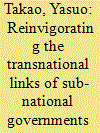

|
|
|
|
|
| Publication |
2010.
|
| Summary/Abstract |
The study of transnational links between sub-national governments is a lacuna in the field of international relations yet the issue on inter-sub-national government cooperation has recently gained greater importance at the international level. Since the 1992 Earth Summit recognition of sub-national authorities as key players in global sustainable development strategies, the importance of decentralised cooperation between sub-national governments has been strengthened by a series of international standardisation and domestic incorporation of this principle. Yet our research raises serious questions about the degree to which Australia-Japan twinning of sub-national governments has made progress towards taking responsibility in facing global challenges. Our case study of Western Australia-Hyogo sister-state relationships shows that their 25 year-old cooperation has been suffering from a lack of awareness of the emerging role of sub-national governments. Not surprisingly, national government policy and position has greatly influenced the nature and patterns of their relationships. Australia and Japan twinning, as leading inter-sub-national partnerships in the region, can do more to promote the value of the local dimension in international development cooperation. In light of these challenges, the future of their twinning must lie in a structured long-term commitment for global strategies as well as mutual benefits.
|
|
|
|
|
|
|
|
|
|
|
|
|
|
|
|
| 12 |
ID:
153251
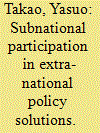

|
|
|
|
|
| Summary/Abstract |
The growing challenges of environment and sustainable development stretch across scales of geographic space and require action at multiple levels of jurisdictions, such as individual level, community level, national level, and global level. Multilevel governance and cross-scale coordination will open up opportunities for a variety of stakeholders to participate in decision-making. While potentially increasing the capacity of governance, the cross-scale and multilevel approaches may face a difficulty in policy coordination created by the plurality of stakeholders and be attended with organizational complexity. This article will examine the potential of subnational participation to make a policy choice, mediated by local governments, to be congruent with global strategies and national mandates in a consistent way. To this end, it will bring a new perspective to Kitakyushu City's experience in Japan as a heuristic test case study. My claim is that subnational actors occupy a strategic position to straddle the division between state and society, between the center and the periphery, and between the domestic and the foreign so they can act as an intermediate agent in reconnecting local action with national policy and turning global strategies into local action for problem solving.
|
|
|
|
|
|
|
|
|
|
|
|
|
|
|
|
|
|
|
|
|